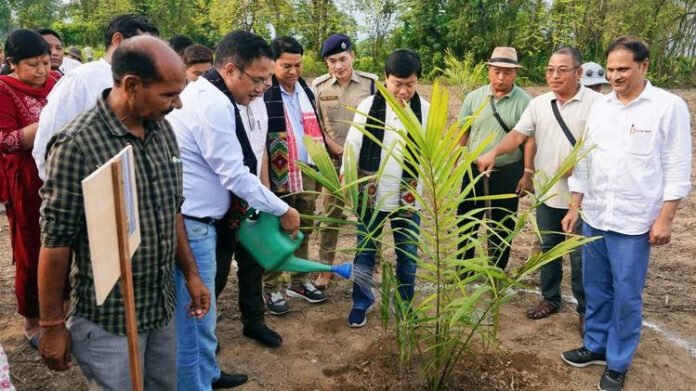Arunachal Pradesh’s Lower Dibang Valley district has launched a mega oil palm plantation drive. The large-scale initiative, held under the National Mission on Edible Oils – Oil Palm (NMEO-OP), aims to transform the region into a major contributor to India’s edible oil production.
Spearheaded by the state’s agriculture department in coordination with private stakeholders, the plantation drive is not only a significant move for local farmers but also a strategic effort to reduce India’s dependency on imported palm oil.
Read More: Centre Approves Final Location Survey for New Sikkim Railway Line
Boosting Local Economy through Strategic Cultivation
The Arunachal oil palm plantation initiative is part of the Central Government’s broader goal to promote indigenous oil palm cultivation. India currently imports more than 60% of its edible oil requirements, a statistic the government aims to reverse through region-specific farming projects.
Lower Dibang Valley, with its suitable agro-climatic conditions, has been identified as a high-potential zone for oil palm farming. The district administration, along with officials from the agriculture and horticulture departments, is working closely with local farmers to ensure smooth implementation of the project.
More than 100 hectares have been covered in the first phase of the plantation drive, with the government providing free saplings, technical guidance, and financial assistance to cultivators. Officials have confirmed that more land will be brought under cultivation in the coming months.
Empowering Farmers, Strengthening Rural Economy
One of the key goals of the plantation campaign is to promote self-reliance in agriculture and boost the rural economy of Arunachal Pradesh. The state government has been actively encouraging farmers to diversify their crops, and oil palm is being promoted as a profitable and long-term solution for income generation.
Speaking at the launch event in Lower Dibang Valley, senior agricultural officials emphasized the importance of sustainable farming and assured farmers of continued support. Training sessions, awareness workshops, and on-ground technical support have already begun to ensure that even first-time growers can succeed with oil palm cultivation.
“This initiative is a game-changer for our farmers. It will not only reduce our edible oil import burden but also empower rural communities with sustainable livelihoods,” said an official from the horticulture department.
A Sustainable Vision for the Northeast
The push for oil palm cultivation is being rolled out carefully to avoid environmental concerns. Authorities have ensured that only wastelands and degraded lands are being used for the plantations. Farmers are also being trained in environmentally responsible farming practices, including water conservation, organic pest management, and soil health monitoring.
The Lower Dibang Valley news of this mega plantation drive is being seen as a successful model for other districts in the Northeast. Several other regions in Arunachal, including Papum Pare, East Siang, and Namsai, are expected to follow suit with similar drives in the near future.
The project also aligns with India’s Atmanirbhar Bharat (Self-Reliant India) vision, where agriculture plays a pivotal role in national growth and food security.
Private Sector Participation
To make the initiative more viable and farmer-friendly, the government has roped in private companies for processing and procurement. These companies will establish oil palm mills within accessible distances, ensuring that farmers don’t face logistical issues while selling their produce. This partnership will guarantee market access, fair pricing, and timely payment for farmers.
The presence of a complete supply chain — from plantation to processing — is expected to give a big boost to oil palm cultivation in India, particularly in underdeveloped regions like Lower Dibang Valley.
The mega oil palm plantation drive in Arunachal Pradesh’s Lower Dibang Valley marks a critical step toward self-reliance in agriculture and rural empowerment. With government backing, technical training, and private sector support, the region is poised to become a vital contributor to India’s edible oil sector. As the state leads the way in responsible, large-scale agricultural reform, it offers a replicable model for other parts of the country looking to harness local potential for national progress.

